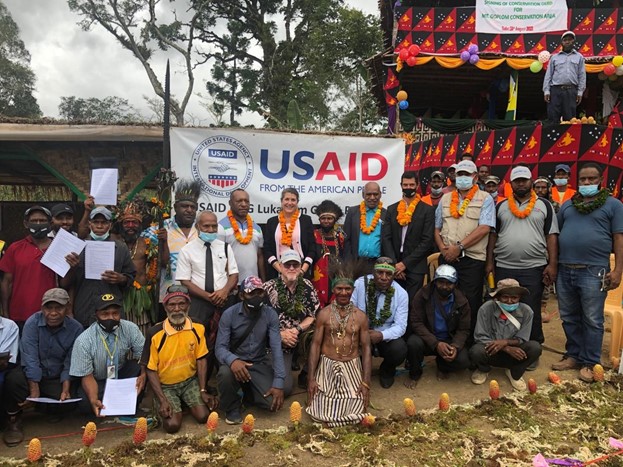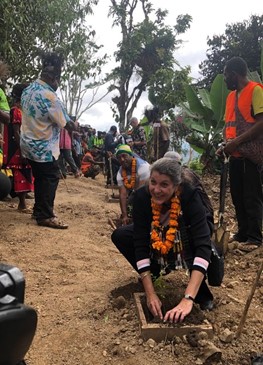Member Spotlight: Empowering Traditional Landowners and Communities for More Sustainable Landscapes in Papua New Guinea
September 1, 2021 / By Corey Nelson and Maurice Knight, Cardno

Conservation Deed Signing Ceremony attended by U.S. Ambassador Erin E. McKee (center standing), USAID LGP Chief of Party Maurice Knight (center kneeling), Governor William Tongamp (center left of Ambassador McKee), WCS Country Director Adrian Tejedor (center right, with jacket and mask), other government and agency representatives and community members from Kwiop Village, Jimi District, Jiwaka Province.
Papua New Guinea (PNG) plays a pivotal role in the global effort to combat the adverse effects of climate change with one of the most significant (and largely intact) tropical forests in the world.
Papua New Guinea’s Forest Authority (PNGFA) estimates that 80% of the country is covered by natural forests, of which 60% are considered intact – approximately half of these are allocated for production, with the other half designated for conservation. This dynamic and diverse canopy is not only critical to global carbon absorption, it also directly supports the livelihoods of more than 4.5 million local community members and shelters some of the world’s most unique species. Pressure on these finite resources continues to mount from an ever-increasing population, escalating impacts of a changing climate, and as the result of poor compatible land use planning.
The USAID Lukautim Graun Program (LGP) – or “Protect the Environment” in Tok Pisin – alongside the PNG Government and in partnership with local NGO/CSO partners, is enhancing the country’s position in the fight against climate change. USAID LGP improving natural resource management (NRM) by strengthening institutions, governance systems, and environmental regulations; engaging the private sector; and empowering traditional landowners, women, and communities for more effective forest management.
Improved Land Use Planning
In Jimi District, Jiwaka Province, USAID LGP supported the conclusion of a years-long dialogue between representatives of seven different clans to create a new community-based forest protected area – Mt. Goplom Conservation Area – the largest community-conserved area of the Bismarck Range, with highly biodiverse, high integrity forests. The community designated three conservation zones: Zone 1 – Contains most of the endangered flora and fauna in the protected area and would be restricted from human interference; Zone 2 – Covers the lowland areas and would remain accessible to humans while being governed by strict conservation laws; Zone 3 – Covers broader land use areas, where conservation laws would still be binding. A Conservation Deed was then drafted to establish a legally-binding agreement, recognized under PNG law, that would permanently protect over 4,000 ha (10,000+ acres) of these traditional and communally-owned forests.
This is the first conservation deed signed in the PNG Highlands

U.S. Ambassador Erin E. McKee, “We look forward and congratulate you on this momentous day and the example you are setting not just for your community, not just for communities in other provinces, but for your whole country. So that Papua New Guinea can be an example and a model for the rest of the world to show how rich resources and tremendous biodiversity can be preserved, conserved, managed, and contribute to a richer, prosperous future.” USAID Representative Julie Hulama, “When they were chanting, they were expressing their joy…so grateful for the work our partners including LGP team for putting this together”
On 31 August 2021, U.S. Ambassador to the Independent State of Papua New Guinea, to the Solomon Islands, and to the Republic of Vanuatu Erin E. McKee, traveled to Kwiop Village in Jimi District to officiate at the Conservation Deed signing ceremony. She was joined by USAID LGP Chief of Party Maurice Knight and USAID representative from the regional Mission in Manila, Julie Hulama.
Coverage of the Conservation Deed signing ceremony is included in this report from PNG’s NBC nightly newscast:
https://www.facebook.com/1498984360245993/videos/2943950625844736/ (7:40-14:04)
Now, Cardno and USAID LGP partners, the Wildlife Conservation Society (WCS) and The Nature Conservancy (TNC), will seek to transfer this experience to other communities in PNG’s Bismarck Forest Corridor provinces of Eastern Highlands, Simbu, and Madang. This includes a core facet of LGP’s work with implementing partners, such as Care International and the Tree Kangaroo Conservation Program (TKCP), on integration and complementarity between gender equity, promotion of women’s economic empowerment, and development of women entrepreneurs in Community Based Natural Resources Management (CBNRM) efforts.
Compatible land use planning at community and provincial levels bolsters sustainable development when coupled with improved regulations and policies, and better engagement with private sector forest industries. USAID LGP is now taking the critical ‘next step’ to ensure uptake of the national PNG Timber Legality Standards (TLS) and the development of a supporting Timber Legality Verification System (TLVS). The TLVS is envisioned as part of a forest sector decision support system that will certify sustainable timber harvest operations in compliance with the TLS. USAID LGP convenes a working group (led by the PNGFA) that includes representatives from Forests for Certain: Forests for Life (FORCERT), World Wildlife Fund Pacific, UN Food and Agriculture Organization, and others.
Conducting rapid forest assessment in Tokain community to support improved land use management and support future forest monitoring.